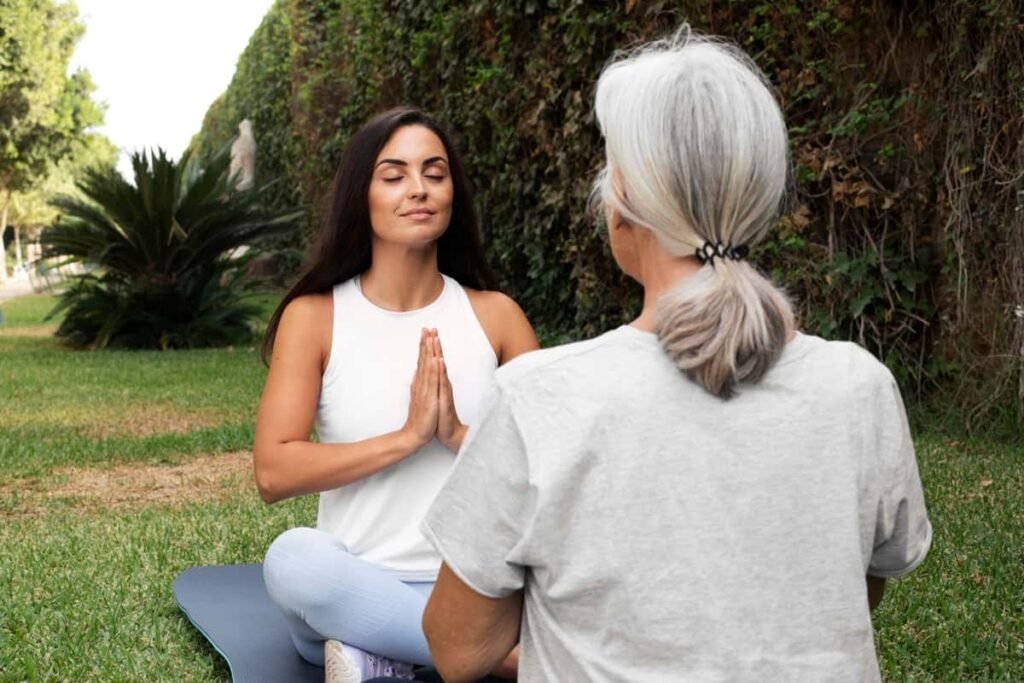Mental Health Exercises to Improve Happiness. It’s a universal pursuit, a state of being we all strive for. But happiness isn’t some elusive destination; it’s a journey, and like any journey, it requires effort, intention, and the right tools. Just as we exercise our bodies to stay physically fit, we must exercise our minds to cultivate happiness and resilience.
Mental health exercises are proactive strategies that can significantly improve your well-being, reduce stress, boost your mood, and ultimately contribute to a more fulfilling and happier life. They’re not a quick fix, but consistently practicing these techniques can create lasting positive changes in your perspective and emotional landscape.
9 Mental Health Exercises

Here are nine mental health exercises you can incorporate into your daily routine to pave the way towards a happier you:
1. Practicing Gratitude: Focusing on the Good
Gratitude is a powerful emotion that shifts your focus from what you lack to what you have. It’s about appreciating the good things in your life, no matter how big or small. Regularly practicing gratitude can boost your overall happiness, improve sleep quality, reduce stress and anxiety, and even strengthen relationships.

How to practice gratitude:
- Gratitude Journaling: Dedicate a few minutes each day to write down things you’re grateful for. These can be anything from having a roof over your head to enjoying a delicious cup of coffee. Aim for at least three things each time. Don’t just list them; reflect on why you’re grateful for each.
- Gratitude Meditation: Close your eyes, take a few deep breaths, and focus on the things you appreciate. Visualize them, savor the positive emotions associated with them, and allow feelings of gratitude to wash over you.
- Gratitude Notes: Write thank-you notes to people who have positively impacted your life. Expressing your appreciation to others not only brightens their day but also reinforces your own feelings of gratitude.
- Mental Gratitude List: Throughout the day, take mental notes of things you’re grateful for. This could be a beautiful sunset, a kind word from a stranger, or simply the ability to breathe freely.
2. Cultivating Mindfulness: Being Present in the Moment
Mindfulness is the practice of paying attention to the present moment without judgment. It’s about observing your thoughts, feelings, and sensations without getting carried away by them. By cultivating mindfulness, you can reduce stress, increase self-awareness, and experience greater joy and appreciation for life.
How to practice mindfulness:
- Mindful Breathing: Sit comfortably, close your eyes, and focus on your breath. Notice the sensation of the air entering and leaving your body. When your mind wanders, gently redirect your attention back to your breath.
- Mindful Walking: Pay attention to the physical sensations of walking – the feeling of your feet on the ground, the movement of your body, and the sights and sounds around you.
- Mindful Eating: Savor each bite of your food, paying attention to the flavors, textures, and aromas. Eat slowly and deliberately, without distractions.
- Body Scan Meditation: Lie down comfortably and bring your attention to different parts of your body, one by one. Notice any sensations you feel, without judgment.
3. Practicing Self-Compassion: Treating Yourself with Kindness
Self-compassion is about treating yourself with the same kindness, care, and understanding you would offer a friend. It involves recognizing that you’re not perfect, that everyone makes mistakes, and that you deserve to be treated with compassion, especially during difficult times. Self-compassion can reduce feelings of shame and self-criticism, boost resilience, and improve overall well-being.
How to practice self-compassion:
- Self-Compassion Break: When you’re struggling, take a moment to acknowledge your pain. Then, remind yourself that you’re not alone, that everyone experiences difficulties, and that you deserve to be treated with kindness. Place your hand on your heart and offer yourself comforting words, such as, “May I be kind to myself.”
- Self-Compassionate Journaling: Write about your challenges from a perspective of kindness and understanding. Imagine you’re writing to a friend who’s going through a similar situation.
- Self-Compassionate Meditation: Practice meditations that focus on cultivating feelings of self-compassion. Many guided meditations are available online.
- Challenge Your Inner Critic: When you notice negative self-talk, challenge the validity of those thoughts. Ask yourself if you would say those things to a friend. Replace negative thoughts with more compassionate and supportive ones.
4. Engaging in Acts of Kindness: Spreading Positivity
Helping others is a powerful way to boost your own happiness. When you perform acts of kindness, you experience a sense of purpose and connection, which can increase your positive emotions and reduce stress. Whether it’s volunteering your time, offering a helping hand to a friend, or simply smiling at a stranger, acts of kindness can make a big difference in both your life and the lives of others.
How to engage in acts of kindness:
- Volunteer your time: Find a cause you’re passionate about and dedicate some time to volunteering.
- Offer help to a friend or family member: Lend a listening ear, run an errand, or offer to help with a task.
- Perform random acts of kindness: Leave a positive note for a stranger, pay for someone’s coffee, or donate to a charity.
- Show appreciation to those around you: Thank your colleagues, express gratitude to your family, and let people know how much you appreciate them.
5. Setting and Achieving Goals: Creating a Sense of Purpose
Having goals and working towards them provides a sense of purpose and accomplishment, which can significantly contribute to your happiness. Goals can be big or small, short-term or long-term, but they should be meaningful to you and align with your values. Breaking down large goals into smaller, more manageable steps can make them feel less overwhelming and increase your chances of success.
How to set and achieve goals:
- Identify your values: What’s important to you in life? What do you want to achieve?
- Set SMART goals: Make sure your goals are Specific, Measurable, Achievable, Relevant, and Time-bound.
- Create a plan: Break down your goals into smaller, more manageable steps.
- Track your progress: Monitor your progress and celebrate your successes along the way.
- Be flexible: Don’t be afraid to adjust your goals or plan as needed.
6. Connecting with Others: Building Strong Relationships
Humans are social creatures, and strong social connections are essential for our well-being. Spending time with loved ones, building meaningful relationships, and feeling a sense of belonging can significantly boost your happiness. Make an effort to connect with people you care about, whether it’s through phone calls, in-person visits, or social activities.
How to connect with others:
- Schedule regular time with loved ones: Make an effort to spend quality time with family and friends.
- Join a club or organization: Find a group of people who share your interests and participate in activities together.
- Volunteer your time: Volunteering can be a great way to meet new people and build meaningful connections.
- Practice active listening: When you’re talking to someone, pay attention to what they’re saying and show that you care.
7. Engaging in Physical Activity: Boosting Your Mood
Exercise is not only good for your physical health but also for your mental health. Physical activity releases endorphins, which have mood-boosting effects. Regular exercise can reduce stress, anxiety, and depression, and improve sleep quality. Find an activity you enjoy, whether it’s walking, running, swimming, dancing, or yoga, and make it a part of your daily routine.
How to incorporate physical activity:
- Start small: Begin with short bursts of activity and gradually increase the duration and intensity.
- Find an activity you enjoy: Choose something that you find fun and motivating.
- Make it a habit: Schedule exercise into your day and stick to your routine.
- Exercise with a friend: Working out with a friend can make it more enjoyable and keep you accountable.
8. Limiting Social Media Consumption: Protecting Your Mental Space
While social media can be a way to connect with others, it can also hurt your mental health. Comparing yourself to others, constantly scrolling through curated content, and feeling the pressure to present a perfect image can lead to feelings of inadequacy, anxiety, and depression. Setting boundaries around your social media use can protect your mental space and allow you to focus on things that truly matter.
How to limit social media consumption:
- Set time limits: Use apps or website blockers to limit the amount of time you spend on social media each day.
- Unfollow accounts that make you feel bad: Curate your feed to only include accounts that inspire and uplift you.
- Take breaks from social media: Dedicate certain days or weekends to disconnecting from social media completely.
- Be mindful of your intentions: Before opening a social media app, ask yourself why you’re doing it and what you hope to gain.
9. Seeking Professional Help: When Needed
Sometimes, despite our best efforts, we may need professional help to address our mental health challenges. If you’re struggling with persistent feelings of sadness, anxiety, or hopelessness, don’t hesitate to reach out to a therapist or counselor. Seeking professional help is a sign of strength, not weakness, and it can provide you with the tools and support you need to improve your mental health and well-being.
How to seek professional help:
- Talk to your doctor: Your doctor can refer you to a mental health professional.
- Contact your insurance company: Find out what mental health services are covered by your insurance.
- Search online directories: Look for therapists or counselors in your area who specialize in your specific needs.
- Ask for recommendations: Talk to friends, family, or colleagues who have sought therapy and ask for recommendations.
Conclusion:
Improving your happiness is a continuous journey, not a destination. By incorporating these nine mental health exercises into your daily routine, you can cultivate a more positive mindset, build resilience, and create a more fulfilling and happier life. Remember to be patient with yourself, celebrate your progress, and don’t be afraid to seek help when you need it. Your mental health is just as important as your physical health, so take care of it!
Also Read,


